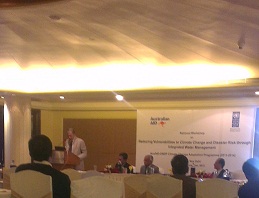/topics/food-and-nutrition
Food and Nutrition
Some strategies for managing groundwater by Aditi Mukherji, IWMI
Posted on 22 Feb, 2013 09:53 AMGroundwater is essential for India's agricutural economy. However, there is a large variation in the groundwater resources of each region. Some regions are already over-exploited, while others can still tolerate more withdrawal. In her blog 'Waterscapes', Aditi Mukherji discusses the need for regional strategies to manage groundwater economy.
Wastewater irrigation in Hubli–Dharwad, Karnataka, enables farmers to diversify their cropping practices - A paper in the Environment and Urbanisation Journal
Posted on 26 Jan, 2013 06:47 PMThis paper 'Wastewater irrigation in Hubli–Dharwad, India: I
Moving from paddy and sugarcane to less water-intensive crops such as oilseeds, pulses and millets can help resolve the Cauvery water dispute
Posted on 14 Jan, 2013 12:10 AMWhat happens when two or more states are dependent on same water resource for agricultural purposes ? Do the states compete for the resource or are their needs sufficiently different from each other? What are the consequences of the competition for this precious resource?
This article sheds light on the dispute between Karnataka and Tamil Nadu, for sharing Cauvery river water. The ongoing tussle between the two states has seen a lot of unrest amongst farmers in form of dharnas, protests, rail roko and non-cooperation by citizens, and disagreement with the agreements made by their respective governments and unending negotiations by governments involved, to come to a mutually agreeable decision.
Punjab chief minister objects to draft national water policy - Roundup of the week's news (December 31 – January 6, 2013)
Posted on 08 Jan, 2013 08:03 AMObjection raised to National water Policy
Centre adopts National Water Policy 2012 - Roundup of the week's news (December 24 – 30, 2012)
Posted on 31 Dec, 2012 07:33 AMCentre adopts National Water Policy, 2012
The issue of food security in India - Case of sodic land reclamation in Uttar Pradesh to preserve the health and productivity of land resources
Posted on 22 Dec, 2012 12:14 PMThe issues surrounding the food security bill, which proposes to confer double benefits-procurement at a remunerative price for the public distribution system are dealt with. This is followed by a discussion on the contribution of usar (sodic land) development to food security in the state of Uttar Pradesh.
Climate change adaptation in water management for food security - A consultation meeting by India Water Partnership
Posted on 19 Dec, 2012 09:20 AMThe meeting held on 22nd November, 2012 at the Institute for Human Development, New Delhi was followed by a discussion which included comments and suggestions of the experts and participants. The meeting was chaired by Prof. S R Hashim, President, India Water Partnership who was accompanied by Dr.
Highlights from the 10-year water policy research programme of the International Water Management Institute and the Sir Ratan Tata Trust discussed at the IWMI - TATA Annual Partners' Meet at Anand, between 28-30 November, 2012
Posted on 05 Dec, 2012 02:06 PMIWMI-Tata water policy research programme is a collaborative initiative between the International Water Management Institute (IWMI) and the Sir Ratan Tata Trust (SRTT).
Sustainable livelihoods: Beans inter-cropping coupled with farmer enthusiasm help boost farm income in Bejaletti village in Erode district of Tamil Nadu
Posted on 03 Dec, 2012 03:16 PMBreaking away from routine is not an easy task. The case with farmers is no different. Our village of interest, Bejaletti in Erode district, is dominated by Sholigas tribals, where farmers mainly engage in agricultural activity for almost 6-7 months of the year.




